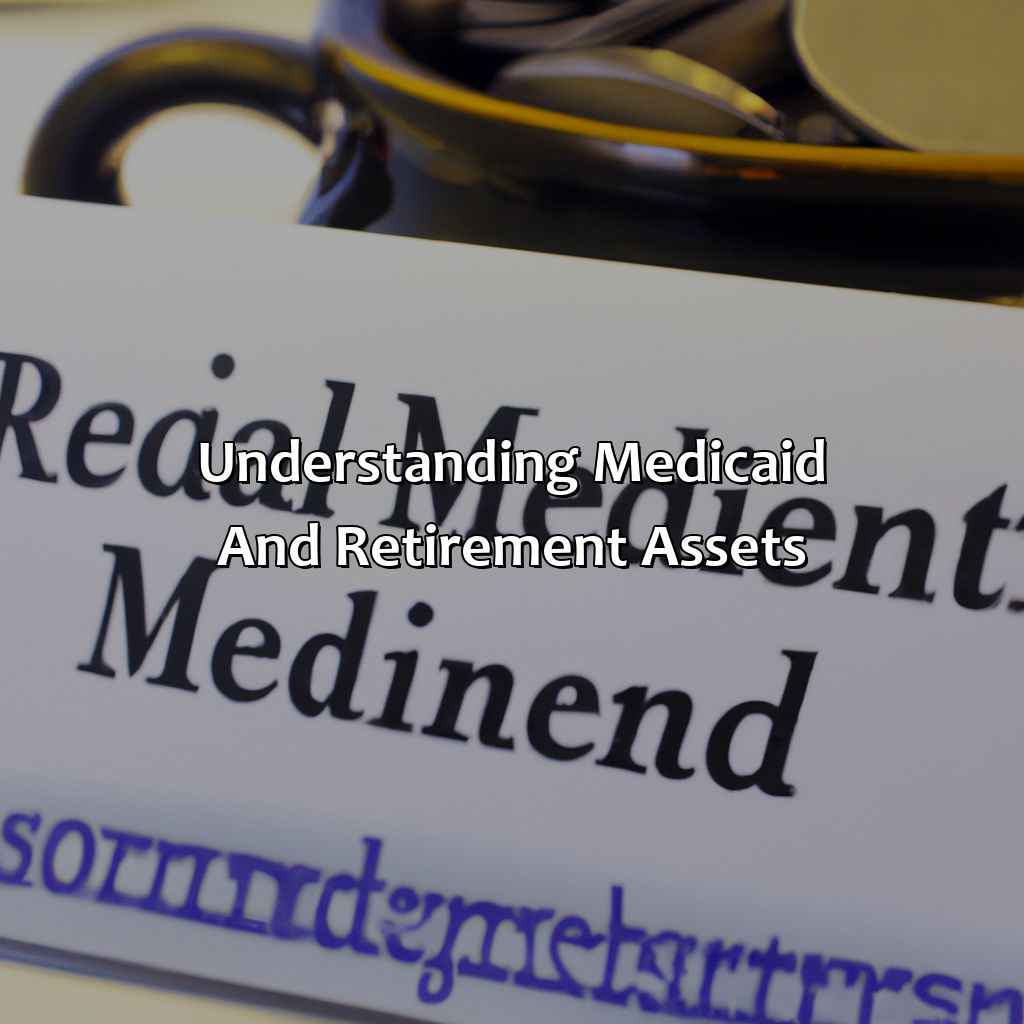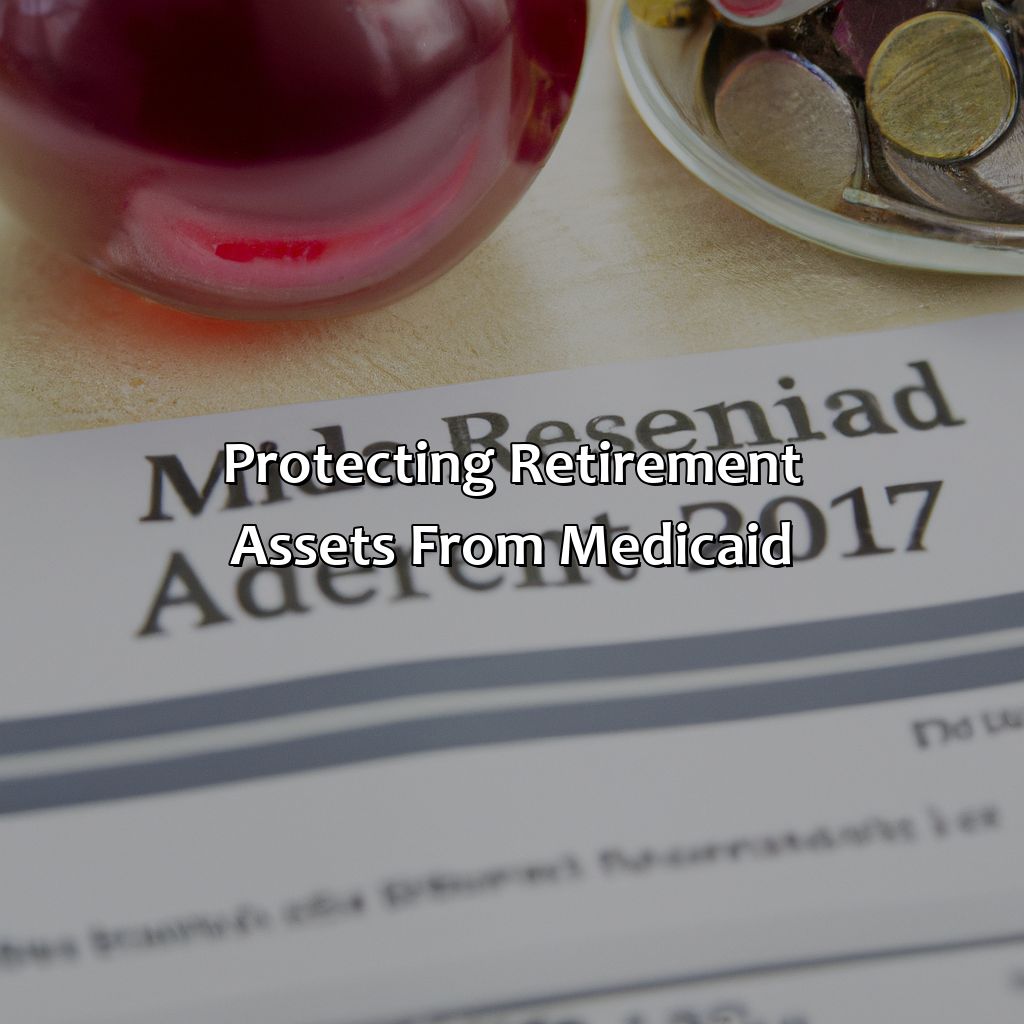How To Protect Retirement Assets From Medicaid?
Key Takeaway:
- Understanding Medicaid and Retirement Assets: It is essential to understand how Medicaid works and what retirement assets are in order to protect them effectively from Medicaid.
- Qualifying for Medicaid: To qualify for Medicaid, your income and assets must be below a certain limit. Understanding these limits and how they apply to your situation is key to protecting retirement assets.
- Protecting Retirement Assets from Medicaid: There are several ways to protect retirement assets from Medicaid, including gifting assets, creating trusts, and converting assets. It is important to consult with a professional to determine the best strategy for your specific situation.
Are you worried about protecting your retirement savings from Medicaid if you need long-term care? Learn how to safeguard your hard-earned retirement assets today and provide for your future.
Understanding Medicaid and Retirement Assets
Retirees often wonder how to safeguard their retirement assets from Medicaid. Understanding the nuances of Medicaid and retirement planning can help individuals protect their assets in old age. Planning for long-term care insurance, transferring assets to family members, and setting up trusts are some of the effective strategies that can be employed to mitigate the impact of Medicaid on retirement savings. By preserving one’s retirement assets, individuals can secure their financial future and achieve peace of mind.

Image credits: retiregenz.com by Harry Arnold
Qualifying for Medicaid
Understand the income and asset limits if you want to qualify for Medicaid with retirement assets. Learn about the benefits of Medicaid plus what it takes to become eligible in this section: “Qualifying for Medicaid“.
Two sub-sections will be explored:
- Income Limits and Asset Limits
- What Qualifies as Retirement Assets
Find out how to protect your assets from Medicaid.

Image credits: retiregenz.com by James Washington
Income Limits and Asset Limits
For those looking to qualify for Medicaid, it is important to consider the limits on both income and assets. Eligibility requirements vary by state, but generally involve income levels not exceeding a certain threshold and limited assets that an individual or couple can have. Here are some key details to keep in mind:
| Income Limits | Asset Limits | |
|---|---|---|
| Individual Applicant | $1,468 per month or $17,616 per year | Countable assets limited to $2,000 |
| Married Couple | $2,014 per month or $24,168 annually | Countable assets limited to $3,000-$4,000 |
In terms of income limits, an individual applicant may typically earn no more than about $1,468 per month or $17,616 per year. For married couples applying together, the monthly limit may be higher at around $2,014 or $24,168 annually.
When it comes to asset limits for Medicaid qualification, these caps tend to be more stringent than many people expect. An individual applicant may only have up to $2,000 in countable assets such as cash in checking accounts or investments like stocks/bonds. For married couples applying together, this limit usually increases to around $3,000-$4,000.
It’s worth noting that there are assets which are exempt from being counted such as a primary residence (with some limitations), personal property like clothing/furniture and one vehicle. Additionally non-countable items are life insurance with specific face values and prepaid burial plans.
One unique detail on Medicaid is that there is a penalty period if an individual has made any asset transfers within the five years prior to their application date except under certain allowable situations. This is known as the “look-back period” where they’re evaluated for any previous undue asset allocation and penalties apply accordingly.
A true history of Medicaid policy would include its origins starting with the federal landscape of healthcare programs in the 1960s until it was amended later on resulting in broader social welfare measures spread across Federal programs as of today backstopping States’ spending resulting into greater coverage along larger proportion of population.
“You know you’re getting old when your retirement assets qualify for Medicaid.”
What Qualifies as Retirement Assets
Retirement assets may include pension plans, 401(k) accounts, IRAs, annuities, and other savings plans. These funds have been set aside for retirement and are essential for individuals to sustain their livelihood after they stop working. However, when it comes to qualifying for Medicaid assistance, the value of these assets can impact eligibility.
It is crucial to experience the guidance and assistance of an elder law attorney or a financial planner who can provide recommendations on how to protect retirement assets from Medicaid. There are several options available that allow one to shield these funds while still qualifying for Medicaid benefits. For instance, converting countable resources into exempt assets such as home equity or establishing an irrevocable trust is a viable option.
Another consideration is purchasing an annuity – which converts assets into monthly income payments over time and lowers the individual’s overall asset value – thus reducing his/her countable resources and enhancing the probability of qualifying for Medicaid benefits.
Medicaid may take your retirement savings, but they can never take away the memories of your youth spent doing keg stands.
Protecting Retirement Assets from Medicaid
To secure your retirement money from Medicaid, think about different choices. Gifting assets, making trusts, and switching assets are ways you can protect your retirement funds if you might need Medicaid. Get the details here!

Image credits: retiregenz.com by James Woodhock
Gifting Assets
To gift assets is an effective way to protect retirement funds from Medicaid. Here are some important points to consider when gifting assets to safeguard your retirement:
- Gifts must be made at least five years before applying for Medicaid benefits.
- Gifts cannot exceed $15,000 per year per person without incurring a gift tax.
- Gifts should not be given back or used by the original owner after being gifted.
- A qualified personal residence trust may be created to protect the value of the primary residence being gifted.
- Gifting appreciated assets can reduce future taxes on capital gains for both giver and recipient.
- Gifting should be done with careful consideration and planning with a financial advisor or attorney.
It’s worth noting that gifting assets should not be done haphazardly as Medicaid has strict rules against transferring assets solely for the purpose of qualifying for benefits. However, if planned carefully, gifting can significantly ease financial burdens in retirement while still protecting eligibility for Medicaid.
One suggestion to consider is creating an irrevocable trust while allowing continued access to income generated from within the trust. This option can maintain control over assets while still meeting Medicaid eligibility requirements. Another suggestion is considering long-term care insurance to cover potential costs not covered by Medicaid. It’s best to consult with a knowledgeable professional to determine which strategy suits your unique financial situation best.
Trust me, creating trusts for protecting retirement assets from Medicaid is like putting money in a vault – safe and sound, until you need it.
Creating Trusts
Trusts Creation Strategies for Safeguarding Retirement Assets
A trust can help in protecting retirement assets from Medicaid. By creating a trust, you can transfer your assets to a trustee who will manage them for the benefit of your beneficiaries. One kind of trust that is frequently used for this purpose is an irrevocable trust. It restricts your access to the assets, but it also makes them unavailable to any creditors.
Creating trusts requires the guidance of legal professionals with vast knowledge of asset preservation strategies. You should work with an attorney who specializes in estate planning and elder law or a financial advisor who has expertise in these areas to help you create a plan tailored to your specific circumstances.
It’s essential to understand that there are different types of trusts, and they all serve different purposes. A qualified lawyer will look at your situation and discuss which trust is best suited for you.
Don’t hesitate to contact an expert today and create a safeguard plan for your retirement assets. Protecting yourself now from possible future Medicaid needs will keep you from missing out on what you’ve saved all those years. Who knew you could put your assets on a conversion diet? Say goodbye to Medicaid’s watchful eye and hello to a leaner, meaner retirement plan!
Converting Assets
One approach for safeguarding retirement assets from Medicaid is by converting them into exempt resources. This can be achieved by transferring assets to a Medicaid-compliant annuity or irrevocable trust. Medicaid considers annuities as an income stream and exempts them from the asset limit, thus protecting retirement assets.
It’s essential to ensure that the conversion process is done according to Medicaid regulations and requirements. Failure to comply may lead to rejection of coverage, resulting in depletion of savings. Professionals with experience in elder law can provide guidance and help navigate these legal processes.
In some states, gifting assets above a certain value may disqualify individuals from receiving Medicaid coverage for five years. Therefore, planning ahead and taking necessary steps avoids losing critical healthcare benefits for seniors and their families.
A retired teacher in New Mexico chose to convert her savings into a Medicaid-compliant annuity in advance of her cancer diagnosis. As a result, she was able to access nursing home care while preserving substantial part of her life savings for her beneficiaries.
Working with a professional is like wearing a life-jacket in a stormy sea of retirement planning – it’s essential and can save you from sinking.
Working with a Professional
Protecting your retirement assets from Medicaid is important. Working with a pro can help. Consulting an attorney and getting financial advice are two sub-sections that offer expert help. Let’s explore them to see how they can safeguard your funds.

Image credits: retiregenz.com by James Jones
Consulting with an Attorney
When seeking help for safeguarding retirement assets from Medicaid, a legal representative’s guidance is vital. An attorney with experience in elder law and Medicaid planning can help provide solutions to protect retirement assets effectively.
Medicaid is an intricate system that requires extensive knowledge of regulations, eligibility criteria, and planning techniques. An attorney can assist with navigating the maze of available options and creating a strategy to protect assets without violating any laws or regulations.
One important factor in selecting an attorney for this role is ensuring their expertise covers all aspects of asset protection. From trusts to estates, the legal representative must be able to design a comprehensive plan that encompasses all areas required for effective protection.
Choosing the right counsel can make all the difference in securing retirement assets from Medicaid. An example of how such a choice might impact one’s retirement was seen with Jim Smith (fictional name), who chose not to consult an experienced elder law attorney when planning his estate. He subsequently lost over half his estate due to Medicaid disqualification – financially crippling him for years to come.
A financial planner is like a fairy godmother, except instead of a magic wand, they have a calculator and instead of a ball gown, they wear a suit.
Seeking Advice from a Financial Planner
One could benefit greatly by seeking assistance from a financial professional when it comes to shielding their retirement assets from Medicaid. It is essential for individuals to safeguard their future finances, and an experienced financial planner can help guide them in doing so.
They may recommend creating a special trust or restructuring the beneficiary designations on any life insurance policies or retirement accounts. An experienced financial planner will examine an individual’s assets and tailor solutions designed to match the individual’s unique circumstances.
Another great suggestion is considering long-term care insurance plans, which can provide protection for significant expenditures while also preserving retirement funds. Long-term care insurance may aid in avoiding exhausting one’s assets while covering expenses not usually covered by health insurance.
Some Facts About How To Protect Retirement Assets From Medicaid:
Medicaid is a government program that provides healthcare coverage for low-income individuals and families.
In order to qualify for Medicaid, individuals must meet certain income and asset requirements.
Medicaid planning involves strategies to protect retirement assets from being counted towards eligibility for Medicaid.
Common Medicaid planning strategies include the use of trusts, gifting, and annuities.
It is important to seek the advice of a qualified elder law attorney when considering Medicaid planning to ensure compliance with state and federal laws.
FAQs about How To Protect Retirement Assets From Medicaid?
How can I protect my retirement assets from Medicaid?
There are several ways to protect your retirement assets from Medicaid:
- Irrevocable trust: You can transfer your assets to an irrevocable trust. This means that the assets are no longer considered yours and are therefore not subject to Medicaid’s asset limit.
- Spending down assets: Another option is to spend down your assets on exempt expenses such as home repairs or prepaying funeral expenses.
- Gifting assets: You can gift your assets to family members or loved ones. However, there are restrictions on the amount you can gift in a given period to avoid being penalized by Medicaid.
What is an irrevocable trust?
An irrevocable trust is a type of trust where the grantor gives up control of the assets placed in the trust. Once the assets are placed in the trust, the grantor cannot change or remove them. This means that the assets are no longer considered the grantor’s property and are therefore not subject to Medicaid’s asset limit.
What are exempt expenses for Medicaid spend down?
Exempt expenses refer to expenses that are considered necessary and are not counted towards the Medicaid asset limit. Examples of exempt expenses include home repairs, prepaying funeral expenses, and purchasing a personal residence for yourself.
What is the Medicaid asset limit?
The Medicaid asset limit is the maximum amount of assets you can have and still qualify for Medicaid. The limit varies by state, but typically ranges between $2,000 and $15,000.
What is the Medicaid lookback period?
The Medicaid lookback period is the period of time that Medicaid looks back to review your financial transactions. In most states, this period is 5 years before the date of your Medicaid application. Any gifts or transfers made during this period may be subject to a penalty.
How can a Medicaid planning attorney help me protect my retirement assets?
A Medicaid planning attorney can help you develop a plan to protect your retirement assets from Medicaid. They can provide advice on the different legal tools available, such as trusts, spend down strategies, and gifting within the limits. They can also review and evaluate your financial situation and provide personalized solutions to help you achieve your goals.
 Checkout this IRS Loophole
Checkout this IRS Loophole 






